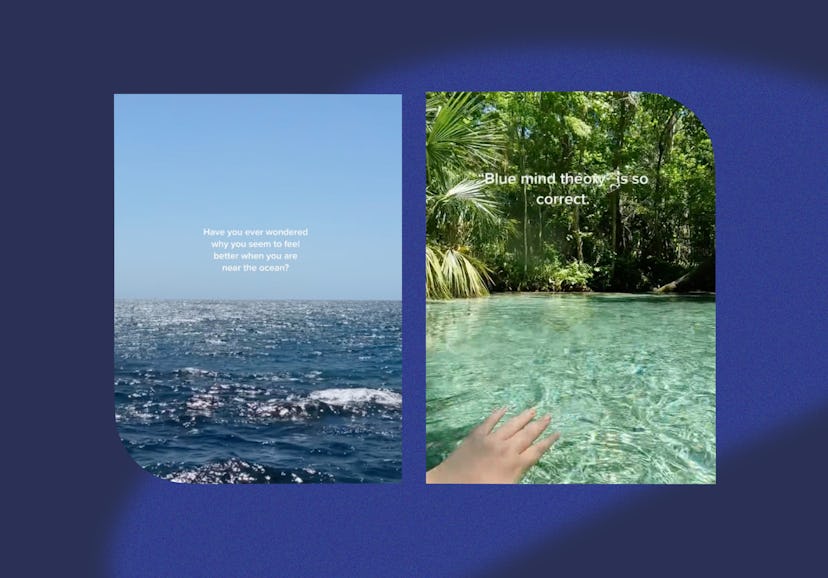Wellness
TikTok’s “Blue Mind Theory” Is Your Excuse To Book A Beach Vacation
It’s why a lot of people find wave sounds so soothing.

While it’s always nice to meditate, do yoga, or vent your frustrations in a journal, if you really want to feel relaxed and restored, then get thee to a body of water, according to TikTok. The viral “blue mind theory” — which has over 15 million views — says that being in or near water is the ultimate stress reliever.
Creator @ronjaedsmo’s video on the topic asked the question, “Have you ever wondered why you seem to feel better when you’re near the ocean?” According to the blue mind theory, it’s because water reduces feelings of stress and anxiety, helps you feel grounded and present, and promotes good sleep all while boosting your overall sense of well-being.
In her comments, one person asked, “Is this why I always [want to] vacation near the beach?” while another wrote, “I feel so positive by the ocean. It just takes my negativity away.” Another joked that they love water because they’re a Pisces, but added it’s probably the blue mind theory at work.
Having a “blue mind” by bodies of water seems to be a pretty relatable experience — not to mention it’s a pretty good excuse to book a vacation. Below, therapists break down TikTok’s latest topic of conversation, all of its benefits, and how to achieve a blue mind at home.
What Is The Blue Mind Theory?
While social media has made the blue mind theory popular again, the term was originally coined by marine biologist Dr. Wallace J. Nichols in 2015, who realized that being in or near water helps your mind enter a calm, meditative state.
A blue mind is the blissed-out feeling that takes over your brain when you’re by the ocean, floating in a pool, walking along a river, or looking out across a lake. According to positive psychologist Reena B. Patel, LEP, BCBA, it’s why so many people love to gather by bodies of water when they need some R&R.
A trip to the beach can relax and restore you, she tells Bustle, though sometimes all you need is 20 minutes by a river, a fountain, or a quick dip in a pool to experience the same effects. Once you get your view of blue, you should feel happier and more uplifted.
The Benefits Of Water
The blue mind theory makes sense — because really, who doesn’t love the beach? — but it’s also backed by science. According to Rachel Goldberg, MS, LMFT, a therapist and owner of Rachel Goldberg Therapy, researchers used fMRI imaging to look at people’s brains, and they found that exposure to natural environments, like water, really does reduce activity in the prefrontal cortex, which is responsible for anxious overthinking.
Watery sights like a glistening lake and sounds like crashing waves or a bubbling river are also good at reducing the stress hormone cortisol in your body. “With lower cortisol levels and reduced prefrontal cortex activity, the byproduct can be feeling less anxious — at least temporarily,” Goldberg tells Bustle.
Blue vistas can also release neurotransmitters in people who have happy memories and positive associations with water, she says, like a childhood spent at the beach or community pool, and it can boost your feel-good endorphins and in turn your mood.
As you relax, your body will exit the stressed-out “fight or flight” mode and ease into “rest and digest.” According to Goldberg, this is when your parasympathetic nervous system takes over to regulate your heart rate and relieve tension. Cut to you taking a nap on the beach.
This is why a blue mind is also said to improve sleep, she says. When you’re body and mind are relaxed, it’s easier to drift off to dreamland. And yes, this is why so many green and white noise machines sound like water.
How To Get A “Blue Mind”
The best way to get a blue mind is to head to a body of water, like a beach, for a day of relaxation. According to Patel, a trip outside will have the added benefits of fresh air and sunshine, and fun, laidback vibes that encourage you to feel at ease.
While it’s obvious why you’d feel relaxed when surrounded by warm Caribbean waters with a tropical cocktail in hand, you can achieve a similar blue mind effect by visiting a nearby lake, river, or pool. If you can, go for a dip in the pool and paddle until your stress melts away.
“For those unable to access any bodies of water, listening to water sounds can also offer benefits,” says Goldberg. “Recordings, such as the sound of ocean waves or rainfall, can still activate the parasympathetic nervous system and lower prefrontal cortex activity.” Close your eyes and pretend you’re lying by the sea, and you’ll soon have a blue mind.
Studies referenced:
Buxton, RT. (2021). A synthesis of health benefits of natural sounds and their distribution in national parks. Proc Natl Acad Sci U S A. doi: 10.1073/pnas.2013097118.
Jo, H. (2019). Physiological Benefits of Viewing Nature: A Systematic Review of Indoor Experiments. Int J Environ Res Public Health. doi: 10.3390/ijerph16234739.
Thoma, MV. (2018). Preliminary evidence: the stress-reducing effect of listening to water sounds depends on somatic complaints: A randomized trial. Medicine (Baltimore). doi: 10.1097/MD.0000000000009851.
Zhang, X. (2021). Waterscapes for Promoting Mental Health in the General Population. Int J Environ Res Public Health. doi: 10.3390/ijerph182211792.
Sources:
Rachel Goldberg, MS, LMFT, therapist, owner of Rachel Goldberg Therapy
Reena B. Patel, LEP, BCBA, positive psychologist